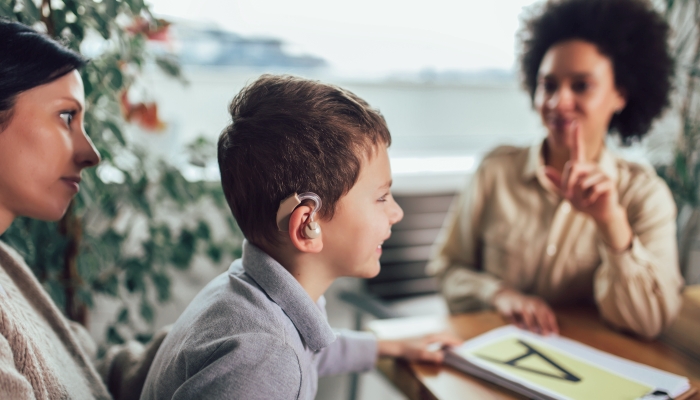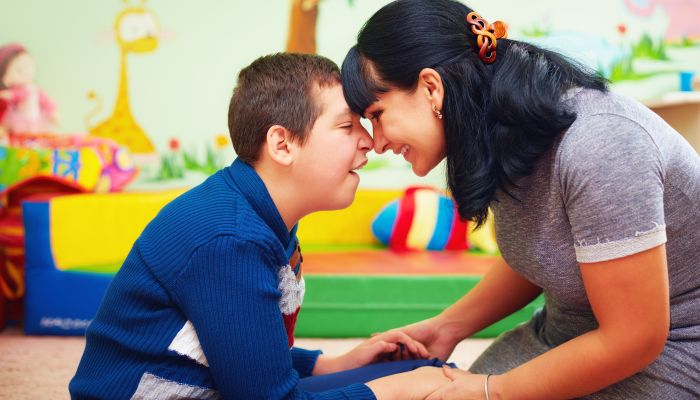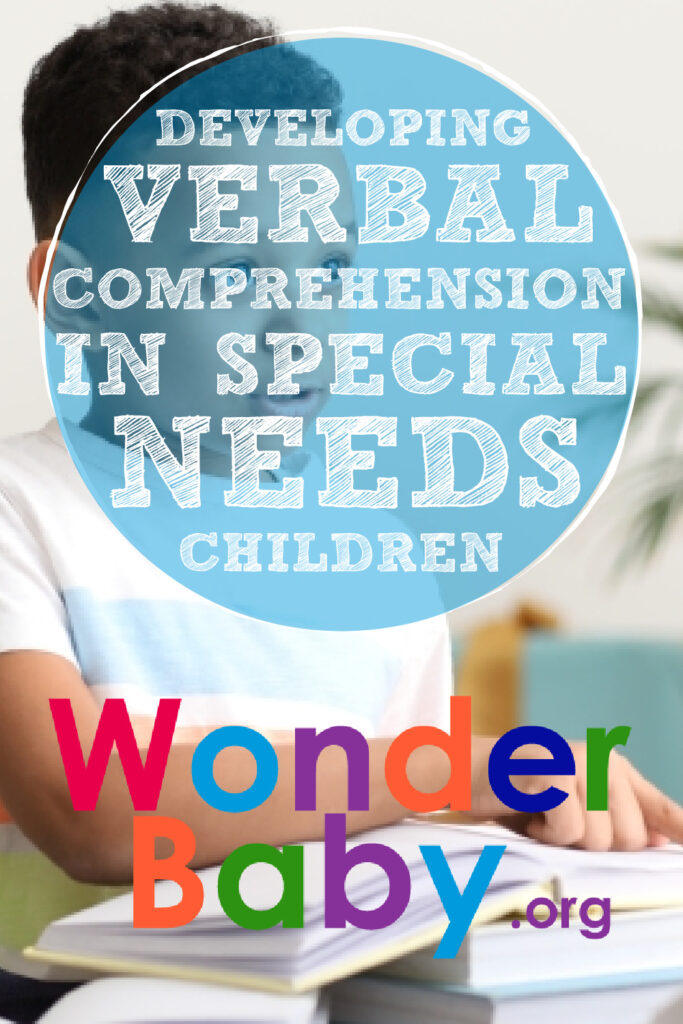Developing Verbal Comprehension in Special Needs Children

- Verbal comprehension is the ability to understand and use words for communication.
- Children with special needs might have a more difficult time with verbal comprehension.
- You can help your child improve their verbal comprehension by reading with them, talking to them, and being patient.
- Reach out to an expert if you notice that your child has trouble communicating their needs or participating in school.
Every parent gets excited when their child finally says their first word. Words are how our children tell us they need something and how we can tell our children that they are loved. Language comprehension and communication are used in almost every part of a child’s day-to-day life.
As your child grows, you can help them develop a good vocabulary and express their ideas. When your child gains more verbal skills, they can express their needs through language instead of temper tantrums.
However, some children develop their language skills slower than others. These children may have communication disorders or may simply need more explicit practice.
Developing verbal comprehension in special needs children can be particularly challenging.
What Is Verbal Comprehension?
Verbal comprehension is the process of understanding and applying word knowledge. High verbal comprehension is associated with more working memory, better communication, and higher academic scores.
Verbal comprehension consists of both semantic and syntactic processing:
Semantic Processing: Semantic processing involves understanding the meaning of specific words. For example, knowing you live in a “house” or that you are eating “food.” This is the simplest form of verbal communication. A child with semantic processing abilities can make their needs known, even if they have poor grammar.
Syntactic Processing: Syntactic processing refers to the understanding of how the order of words can change their meaning. For example, saying “mom is on the couch” and “the couch is on mom” are very different.

How Verbal Comprehension Affects Learning
Strong verbal comprehension is critical for children to perform well in school. In order for students to understand their peers and teachers, they must have the ability to recognize and understand spoken words.
Even seemingly unrelated subjects like math and art require a certain amount of verbal comprehension. A child must be able to understand instructions and follow directions in every type of learning environment.
Verbal Comprehension in Day-to-Day Life
You and your child use verbal communication skills constantly during the day. For example, when you ask your child to get dressed or your child tells you they are hungry.
When a child struggles with communication, they may not get all of their needs met. Parents of special needs or non-verbal children often have to pay attention to non-verbal cues from their children.
How to Identify Verbal Comprehension Problems in Children
Children who are not meeting communication milestones as they get older may struggle with verbal comprehension. Children with small vocabulary for their age, trouble communicating, and difficulties understanding may need early intervention.
Verbal Comprehension Index
One of the most commonly used verbal comprehension tests is the VCI (verbal Comprehension Index). This tests looks for a child’s ability to:
- Learn and recall information about the world around them
- Recognize and understand words and verbal communication
- Express their thoughts and knowledge verbally
- Problem solve based on new learning
Low scores do not necessarily mean a child has a low intelligence or learning disability, but may just indicate that they need more learning opportunities. Explicit practice with language and problem-solving can help children improve their VCI score.

Verbal Comprehension Challenges in Children With Special Needs
Communication disorders are common among children in the United States. Around 7% of children are affected by some kind of speech or language disorder. Conditions contributing to verbal comprehension difficulties can include the following:
Oral/Written Language Disorder: People with a general oral or written language disorder have trouble with verbal and written communication. They may not recognize words or their meaning at all.
Dyslexia: Kids with dyslexia have difficulty with language, verbal communication, and also have struggle to learn to read and write. Parents might notice that their child has difficulties with spoken words, mixing up sounds, or being unable to tell the difference between words that are similar. Children with a diagnosis of dyslexia can learn to read fluently with the right guidance and practice.
Autism: Difficulty with language comprehension is not always obvious in a child with autism. Depending on the severity of their verbal communication difficulties, autistic children may appear to have perfectly fine communication skills. However, children with autism may not be able to pay attention when you’re talking. They may be thinking of how to answer and struggle to listen to what you’re saying. In addition, some children with autism will engage in echolalia, or the repetition of words that someone else says. Echolalia that continues past the age of three can be a sign of autism.
Hearing Problems: Hearing loss can lead to major speech delays in children. Children with hearing problems should be placed in early intervention to help with their communication skills. Learning sign language early helps children communicate with their teachers and peers. The American Speech Language Hearing Association states that children with hearing problems can fall behind their peers by up to four grade levels. Early intervention can help close this gap.
Behavior problems related to verbal comprehension
Difficulty in school due to weakness with verbal communication can cause frustration for children. When a child struggles to express their ideas or needs they often act out.
It’s important for parents and teachers to determine whether behavior problems are a result of poor verbal skills or another cause.
How to Improve Verbal Comprehension in Children With Special Needs
Parents can enhance their child’s ability to communicate and understand with practice and patience. Even children with a serious diagnosis or severe disability can find ways to communicate.
Some ways for parents to help their children include:
- Provide opportunities to practice
- Read books and tell stories that interest your child
- Keep things fun
- Choose a “word of the day” that you and your child can practice together
- Practice non-verbal communication
- Consider using Augmentative and Alternative Communication (AAC) devices
Singing, story telling, and reading picture books are excellent ways to teach children new words while keeping the learning fun and stress-free.
Reducing screen time can also help kids develop better verbal skills. Watching TV has been shown to decrease children’s ability to communicate. When young children spend too much time watching TV, they spend less time talking. Children’s brains learn better by participating than by watching others. Furthermore, television sounds can be confusing for children. Background noise and overlapping conversations in videos make words sound jumbled and difficult to isolate.

When to Consult an Expert
Some kids can improve their communication at home. Involved parents who practice with their kids make a big difference in their child’s word knowledge.
Other children, such as kids with learning disabilities or severe speech problems, need more than practice at home and would benefit from early intervention and direct services with a speech therapist.
Some signs that your child may need expert help include:
- No babbling at 9 months
- No first words by 15 months
- No word combinations by 24 months
- Not showing interest in communicating
- Problems understanding your child’s speech at 36 months
Children who start speech therapy early have better results than kids who start later. Kids’ brains are extremely receptive to learning! Starting speech therapy before age 5 is ideal.
FAQs
Does low verbal comprehension also mean low IQ?
Verbal comprehension is part of what’s included in an IQ test. However, a child with poor verbal comprehension may be gifted in another area. A child with low verbal comprehension does not necessarily have a low IQ.
How can I pay for early intervention for my child?
Young children aged 0-3 can receive free early intervention services if they qualify for them. The Individuals with Disabilities Education Act requires that all families have access to early intervention programs when needed. Every family can receive a free evaluation for their child through state services in the US.
For school-aged children, public school systems often have resources for parents and their children to help with special needs. Some services are not free. These may include medical services, medical devices, and transportation to appointments, but even in these cases working with a social worker can help you to find funding options in your area.
Can a nonverbal child have verbal comprehension?
Many nonverbal children are able to understand speech. Just because a child doesn’t speak doesn’t mean they won’t communicate. Most children have an easier time understanding than forming their own words.
Does using sign language help with verbal comprehension?
Yes! Young babies who learn sign language have faster development of expressive language. Some children with special needs are able to use sign language as their primary form of communication.
When a child uses sign language to express their needs and wants, they are often encouraged to communicate more. This can motivate them to use verbal communication as a means to get what they want.

The information WonderBaby provides is not intended to be, and does not constitute, medical or other health advice or diagnosis and should not be used as such. Always consult with a qualified medical professional about your specific circumstances.
Related Posts

Eye Conditions and Syndromes, Visual Impairment
Neuralink Announces Plans to Restore Sight to the Blind with Brain Chip
Elon Musk’s company Neuralink has announced plans to begin human trials of its new “Blindsight” brain chip by the end of 2025.

Special Needs
5 Spring Cleaning Tips for Families of Children with Disabilities
Spring cleaning is an opportunity to create a more accessible, organized, and supportive space for your child with disabilities. Declutter, deep clean, and refresh!

Visual Impairment
The Gift of Understanding: How a Young Child Helps His Blind Father Navigate Life
When a parent is blind, it’s natural for people to wonder how their sighted child will adapt. Will they struggle to understand their parent’s needs? Will they feel burdened by...